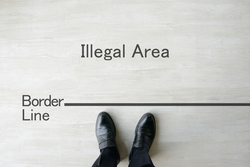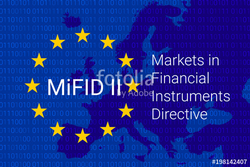The recent news
March 8, 2022
Hearings by a Committee or Public organisation

🌐suivre Marie-Anne Frison-Roche sur LinkedIn
🌐s'abonner à la Newsletter MAFR Regulation, Compliance, Law
____
► Référence complète : M.-A. Frison-Roche, audition par la Commission des Lois du Sénat sur la Proposition de Loi constitutionnelle relative à l'interruption volontaire de grossesse et à la contraception, 27 septembre 2022.
►Référence complète : M.-A. Frison-Roche, Audition par la Section du Rapport et des Etudes du Conseil d'Etat pour la préparation du Rapport annuel sur Les réseaux sociaux, Conseil d'Etat, 8 mars 2022.
____
►Résumé de la présentation faite avant la discussion : Pour la partie reproductible de cette audition, consistant dans la présentation qui a pu être faite de la relation entre le Droit de la Compliance et le phénomène des réseaux sociaux, il a été repris l'idée générale d'un impératif de "réguler un espace sans ancrage" et l'apport que représente pour cela le Droit de la Compliance, dès l'instant qu'il n'est pas défini comme le fait de "se conformer" à l'ensemble de la réglementation applicable à l'agent mais comme la charge d'atteindre des "Buts Monumentaux", négatifs ou/et positifs, l'opérateurs ainsi chargé de cette obligation de moyens parce qu'il est en position de le faire, devant avoir la puissance pour y parvenir.
Se dégagent alors des notions nouvelles, comme la "Responsabilité Ex Ante" ou une notion de "Pouvoir" qui est commune aux opérateurs de droit privé et de droit public, leur nationalité venant également en second plan, le Droit de la Compliance étant naturellement a-territorial.
Cette définition substantielle du Droit de la Compliance qui met en première ligne les opérateurs requiert que ceux-ci soient supervisé (dans un continuum entre Régulation, Supervision, Compliance,) le Droit de la Compliance opérant un continuum du Droit de la Régulation en n'étant plus lié avec l'impératif d'un secteur. Les opérateurs cruciaux numériques sont ainsi "responsabilisés", grâce à une "responsabilité Ex Ante", et s'ils sont supervisés par des Autorités de supervision (dont le modèle historique est le superviseur bancaire, ici l'Arcom), c'est le juge qui a fait naitre cette nouvelle notion de "responsabilité Ex Ante, pilier du Droit de la Compliance, aujourd'hui délivré du territoire dans une jurisprudence à propos du Climat qu'il convient de concevoir plus largement.
Ainsi délivré du secteur et du territoire, le Droit de la Compliance peut affronter le mal des réseaux sociaux que sont la désinformation et l'atteinte des enfants, maux systémiques où peut se perdre la Démocratie, perspective face à laquelle l'Ex Post est inapproprié.
Le Droit de la Compliance est donc pleinement adéquat.
Il convient que le Juge continue sa mue en concevant lui-même non pas seulement dans un Ex Post plus rapide, mais dans un office Ex Ante, contrôlant des entreprises qui, elles-mêmes doivent avoir des fonctions des offices de gardiens (ici gardiens des limites concernant les contenus).
______
Voir ⤵️ la structure plus formelle de l'intervention, qui fut ensuite discutée
Feb. 23, 2022
Teachings : Droit de la régulation bancaire et financière - semestre 2022

 ► Référence complète : Frison-Roche, M.-A., La régulation des prises de contrôle des sociétés dont le capital est exposé aux marchés financiers, in Leçons de Droit de la Régulation bancaire et financière, Sciences po (Paris), 23 février 2022.
► Référence complète : Frison-Roche, M.-A., La régulation des prises de contrôle des sociétés dont le capital est exposé aux marchés financiers, in Leçons de Droit de la Régulation bancaire et financière, Sciences po (Paris), 23 février 2022.
____
Résumé de la leçon sur la Régulation des prises de contrôle des sociétés dont le capital est exposé aux marchés financiers : Dans son lien avec la gouvernance, le Droit de la régulation bancaire et financière a l'ambition d'organiser la façon dont les pouvoirs s'organisent au sein des entreprises, son prisme le conduisant à orienter cette gouvernance vers la protection de l'épargne, des investisseurs et des marchés. Imprégnant ainsi le Droit des sociétés, c'est contre cela que le rapport Notat-Senard a réagi, ce que la loi PACTE a donné forme.
Il demeure que si la société est cotée, ce qui ne correspond pas à toutes les entreprises, le Droit de la régulation continue à influer cette gouvernance à travers le principe de transparence. Ce principe devient impératif lorsqu'il y a une perspective de changement de contrôle. En effet les marchés financiers ne sont pas seulement des marchés de rendements pécuniaires, ils sont aussi des marchés de pouvoirs, ce qui renvoie à la double nature du titre de capital qu'est l'action : celle-ci offre à son titulaire des droits patrimoniaux potentiels et droits politiques actifs, même s'ils n'emportent pas forcément pouvoir de décision.
Ce marché du pouvoir et du contrôle des sociétés est par excellence le marché boursier. Les prises de contrôle, qui pourraient en rester à la nature de contrats d'achat et de vente, sont entièrement gouvernées par l'Autorité de Régulation, en France l'AMF. L'on part donc du principe d'une offre, mais il peut arriver que cette offre d'achat (ou d'échange) devienne "obligatoire", lorsque des seuils de prise de contrôle sont déjà atteints (30%). Même lorsque des textes interviennent dans un sens libéral, comme en ce qui concerne le contrôle des montants proposés par les offreurs dans le mécanisme d'OPA ou d'OPE les directives de l'Union européennes demandant à ce que les Régulateurs ne contrôlent plus le caractère "équitable" de celui-ci, les juges admettent que par le visa de l'office général du Régulateur et la bonne information de l'actionnaire un tel contrôle soit maintenu, voire accru (cas Altice).
Le marché financier pénètre déjà dans cette régulation des pouvoirs sociétaires lorsque la société est "exposée" au marché financier par la cotation de ses titres sociaux, ou par le mécanisme plus général de financement de marché, les investisseurs titulaires de titres de créance demandant le bénéfice de la même transparence, voire des droits politiques analogues à ceux dont bénéficient les titulaires des titres de capital. Mais les entreprises, à travers leur structuration sociétaire, sont définitivement "ouvertes" lorsque leur capital, c'est-à-dire non seulement leur richesse mais encore le pouvoir politique, est disponible sur ce marché financier spécifique qu'est le marché boursier. Le Droit régule alors les procédés de "prise de contrôle", tâche première de l'Autorité des marchés financiers, car si le pouvoir est par principe disponible, la "loi des volontés" ne peut suffire. L'on retrouve alors, mais sous une forme plus nette, les lois du capital, des volontés et des intentions.
Le Droit pose en effet le principe même des "offres publiques", les opérateurs devant tout d'abord révéler leur "intention" de prendre le contrôle, puis devant offrir à tout actionnaire une contrepartie soit en argent soit en titres. Dans cet achat du pouvoir, le Régulateur boursier joue un rôle central, mais les textes européens dans une perspective plus libérale que précédemment ont posé qu'il n'a pas à contrôler le caractère équitable du prix que l'initiative de l'offre propose, concentrant davantage son pouvoir sur l'information due aux personnes "intéressées", ce qui est excède le seul cercle des titulaires des titres de capital, pour concerner le cercle de la catégorie qui commence à s'implanter dans le nouveau Droit des sociétés qui se dessine : les "parties prenantes". Par la régulation des "prises de contrôle des sociétés ouvertes", l'on quitte de plus en plus l'idée d'une Régulation jouxtant l'économie administrée, parce qu'il s'agirait de la puissance étatique tenant les structures du marché financier afin que celui-ci soit fiable, le premier principe étant la transparence, pour aller vers une Régulation jouxtant la "Gouvernance" des sociétés qui sont exposées aux marchés financiers et qui à ce titre doivent admettre que leur fonctionnement politique doit être transparent, notamment au regard du futur de l'entreprise, voire partagé avec ceux qui ont un intérêt financier avec ce fonctionnement, voire avec également ceux qui y ont un intérêt non directement financier. En cela, le Droit de la Régulation des marchés financiers, en procéduralisant et en contrariant le fonctionnement trop brutal de ceux-ci, est le bastion avancé d'un fonctionnement plus général des sociétés, de nombreuses dispositions ayant tendance à être bilatéralisées dans le Droit des sociétés non-cotées, puisque cette distinction n'existe pas formellement par ailleurs dans le Droit des sociétés.
Le cas Veolia/Suez a mêlé toutes ces dimensions, qui se contredisent souvent, voire s'affrontent.
____
🔎 Accéder aux slides servant de support à la leçon sur les principes et la place de la répression dans le Droit de la Régulation bancaire et financière
🔎 Revenir aux bases avec le Dictionnaire bilingue du Droit de la Régulation et de la Compliance
🔎 Approfondir par la Bibliographie générale de Droit de la Régulation bancaire et financière
🔎 Revenir à la présentation générale du cours
🔎 Se reporter au plan général du cours
____
Voir ci-dessous la bibliographie de base et d'approfondissement relative au Droit des prises de contrôle des sociétés ouvertes ⤵️
Feb. 16, 2022
Teachings : Droit de la régulation bancaire et financière - semestre 2022

 ► Référence complète : Frison-Roche, M.-A., Les principes et la place de la répression dans le Droit de la Régulation et de la Supervision bancaire et financière, in Leçons de Droit de la Régulation bancaire et financière, Sciences po (Paris), 16 février 2022.
► Référence complète : Frison-Roche, M.-A., Les principes et la place de la répression dans le Droit de la Régulation et de la Supervision bancaire et financière, in Leçons de Droit de la Régulation bancaire et financière, Sciences po (Paris), 16 février 2022.
____
► Résumé de la leçon sur les principes et la place de la répression dans le Droit de la Régulation et de la Supervision bancaire et financière : Après avoir vu précédemment les règles techniques qui gouvernent la sanction et la prévention des Abus de marché, il convient pour mieux comprendre les décisions et les conflits de revenir sur la tension permanente et peut-être définitive qui marque les principes et la place de la répression dans le Droit de la régulation bancaire et financière : dans le même temps qu'elle est un outil presque ordinaire de la Régulation, puisque la répression des abus de marché assure l'intégrité et le fonctionnement des marchés financiers, la répression ne peut et ne doit se soustraire à ce avec quoi elle entretient un lien de filiation : le Droit pénal. Dès lors et par exemple, alors qu'au premier titre, l'efficacité est son premier souci, au second titre, les droits de la défense et le souci des secrets demeurent, tandis que la nature régalienne du Droit pénal trace un cercle par nature national alors que la Régulation financière est au mieux mondiale, au moins européenne.
Il convient de reprendre cette question à travers une perspective plus générale, notamment à travers le Droit pénal et le droit européen.
En effet, dans le même temps et parce qu'il s'agit de mécanismes qui ne peuvent pas faire sécession avec le système juridique, sa structure et ses fondements, l'on pourrait penser que la répression en matière bancaire et financière est une déclinaison du droit pénal général, qu'elle en emprunte et en respecte les principes généraux, concevant des infractions spéciales pour les besoins qui lui sont propres. Ainsi, tout ce qui caractérise le Droit pénal , l'élément intentionnel de l'infraction, le caractère restrictif de l'interprétation des textes, le principe de la personnalité des délits et des peines, le système procédural indissociable des règles substantielles (comme les charges de preuve ou le principe non bis in idem) devrait s'appliquer dans des infractions générales qui concernent le secteur , comme l'escroquerie ou l'abus de confiance comme dans les infractions plus particulières, comme l'abus de biens sociaux, voire des infractions spécifique comme le blanchiment d'argent.
Mais et tout d'abord, par souci d'efficacité , le droit a tout d'abord développé un système de répression qui a emprunté d'autres méthodes, imprégnées avant tout du souci d' efficacité . En outre, le droit a organisé une sorte de double jeu répressif, par un droit administratif répressif à la disposition des régulateurs, qui prend assez souvent distance par rapport au droit pénal classique, lequel continue pourtant de s'exercer.
Les tensions ne peuvent qu'apparaître. A l'intérieur du droit pénal , dont les principes sont assouplis alors que la rigidité du droit pénal est dans sa nature même, dans l'articulation du droit pénal avec le droit administratif répressif , guidé par le service efficace de l'ordre public de marché, les Cours constitutionnelles tentant de garder un équilibre à l'ensemble.
Il faut sans doute prendre acte que contrairement aux principes classiques, le droit pénal financier n'est plus autonome du reste de la régulation , la répression devient objective, l' efficacité est son critère et ses objectifs sont systémiques. La loi dite "Sapin 2" le manifeste en internalisant tout le dispositif répressif dans les opérateurs eux-mêmes, devenant à la fois les assujettis et les agents d'effectivité de la Régulation .
____
🔎 Revenir aux bases avec le Dictionnaire bilingue du Droit de la Régulation et de la Compliance
🔎 Approfondir par la Bibliographie générale de Droit de la Régulation bancaire et financière
🔎 Revenir à la présentation générale du cours
🔎 Se reporter au plan général du cours
____
Voir ci-dessous le reste des supports utiles au suivi profitable de la leçon
Feb. 9, 2022
Teachings : Droit de la régulation bancaire et financière - semestre 2022

 ► Référence complète : Frison-Roche, M.-A., Prévention et sanction des Abus de Marchés, in Leçons de Droit de la Régulation bancaire et financière, Sciences po (Paris), 9 février 2022.
► Référence complète : Frison-Roche, M.-A., Prévention et sanction des Abus de Marchés, in Leçons de Droit de la Régulation bancaire et financière, Sciences po (Paris), 9 février 2022.
____
► Résumé de la leçon sur les Abus de marché : Dans une conception classique et du Droit et du "libre marché", le principe est la liberté d'action de la personne. Même si l'exercice de cette liberté, voire d'un droit subjectif peut causer un dommage, par exemple un dommage concurrentiel, c'est en quelque sorte le prix légitime d'une société libre et concurrentielle. Ainsi dans une conception libérale, seul l'abus est sanctionné, c'est-à-dire l'exercice fautif que l'on fait de sa liberté ou de son droit, allant parfois jusqu'à l'exigence d'une faute qualifiée.
Mais les secteurs bancaires et financiers ne sont pas gouvernés par le principe de libre concurrence. Ils sont gouvernés par le principe de régulation, le principe de concurrence n'y a qu'un rôle adjacent. Cela ne pourra qu'engendrer de graves difficultés lorsque le Droit de la concurrence et le Droit bancaire et financier font s'appliquer d'une façon cumulée ou confrontée sur une même situation.
Les marchés financiers sont construits sur le principe de régulation qui pose le principe de transparence et de partage d'une information exacte : c'est ainsi que l'intégrité des marchés financiers est assurée, l'Autorité des Marchés financiers en étant le gardien.
La prévention et la sanction des "abus" de marché est donc non pas une part résiduelle du Droit financier, mais un pilier de celui-ci, contrairement au Droit des marchés ordinaires concurrentiels, sur lesquels l'opacité et le non-partage des informations est la règle.
Cela explique l'état du droit des "abus de marché", dont l'effectivité de la prohibition est essentielle pour le bon fonctionnement ordinaire des marchés financiers. Leur prohibition nationale a été harmonisée par le Droit de l'Union européenne, à travers des textes dont les signes reprennent l'appellation anglaise : Market abuses (ainsi le nouveau Règlement communautaire sur les abus de marché est dit Règlement MAR (Market Abuses Regulation) et la directive qui l'accompagne MAD (Market Abuses Directive).
Il sanctionne un certain nombre de comportements, qui portent atteinte à l'intégrité des marchés,
Mais il n'exprime plus des exceptions par rapport à un principe : des fautes par rapport à des libertés ou à des droits. Il exprime des moyens par rapport à des principes dont la sanction des abus ne constitue que la concrétisation de principes dont ils sont la continuité même : l'efficacité du marché, son intégrité, sa transparence, l'information de l'investisseur.
C'est pourquoi la sanction des abus de marché ne sont pas du tout un phénomène périphérique par rapport à la Régulation des marchés financiers et à l'activité et au fonctionnement des bancaires, comme l'est le Droit pénal : elle est au contraire à la fois ordinaire et centrale. Cette différence des deux ordres publics va se retrouver dans la question lancinante de la sanction pénale et de la sanction administrative des mêmes abus de marché (par exemple "manquement d'initié" et "délit d'initié", qui ont tendance à se cumuler dans des techniques de répression qui seront l'objet de la prochaine leçon.
_____
🔎 Accéder aux slides servant de support à la leçon sur les abus de marché
🔎 Revenir aux bases avec le Dictionnaire bilingue du Droit de la Régulation et de la Compliance
🔎 Approfondir par la Bibliographie générale de Droit de la Régulation bancaire et financière
🔎 Revenir à la présentation générale du cours
🔎 Se reporter au plan général du cours
____
Utiliser les matériaux ci-dessous pour aller plus loin et pour préparer votre conférence de méthode ⤵️

Updated: Feb. 5, 2022 (Initial publication: Oct. 10, 2021)
Publications

 ► Full Reference: Frison-Roche, M.-A., Duty of Vigilance, Whistleblowing and International Competitiveness, Working Paper, September 2021.
► Full Reference: Frison-Roche, M.-A., Duty of Vigilance, Whistleblowing and International Competitiveness, Working Paper, September 2021.
____
🎤 this Working Paper is the basis for a conference , in the colloquium Effectiveness of Compliance and International Competitiveness, co-organised by the Journal of Regulation & Compliance (JoRC) and the Center for Law and Economics of the Panthéon-Assas University (Paris II), November 4, 2021
____
📝this Working Paper is also the basis for an article. This article is to be published ⤵
in its French version in the book 📕Les buts monumentaux de la Compliance, in the series 📚Régulations & Compliance
in its English version in the book 📘Compliance Monumental Goals, in the series la collection 📚Compliance & Regulation
____
► Working Paper Summary: The "Compliance Tools" are very diverse. If it has been chosen to study more particularly among these the obligation of vigilance and the whistleblower, these rather than others and to study them together, it is because they present in the perspective of the specific topic chosen, namely "international competitiveness", and for companies, and for economic zones considered, and for legal system inseparable from them, a uniqueness: these are mechanisms which release Information.
By order of the law, the company will not only stop ignoring what it covered with the handkerchief that Tartuffe held out to it or that a conception of Company Law legitimately allowed it to ignore. This article does not examine if this revolution made by Compliance Law expresses in the legal system is on the one hand legitimate and on the other hand effective: the article measures what is happening at the regard to "international competitiveness".
Compliance Law is therefore be examined here through its instruments, and not in relation to its normativity. In fact, its instruments are intended to provide Information and to make this information available, in its presentation, in its intelligibility and in the hands of those who are able to use Information in perspective of the Compliance Monumental Goals, achieving them.
Regarding this central notion of Information, international competitiveness will be more particularly concerned because Compliance Law will oblige the company itself to seek out, then expose to everyone's eyes, in particular its competitors, its weaknesses, its projects, its alliances, its flaws. This does not pose a problem if its competitors themselves are often subject to this new branch of Law, which goes far beyond transparency, which is already a new mechanism because a company is not a transparent organization and Competition Law that governs ordinary businesses never required this. But if they are not subject to this incredibly special branch of Law that is Compliance Law, then there is a distortion of competitiveness by the very fact of the Law.
It is possible to pretend that the markets like virtue, that they give it credit because they are themselves based on the idea of "promise", which is ultimately based on a moral concept, but this provision of Information to others, while others remain opaque, is a major problem of competitiveness, which the legal requirement of "loyal commercial practices" only very partially considers.
Therefore, it is necessary to first examine what is the economic and financial power of the information captured by the company on itself thank to Compliance Law making available to all but firstly to the compagny itself through the whistblowing mechanism, organised by the laws, differently in the US and Europe (I). Compliance Law also obliges companies to be accountable not only for what they do but also for what others do for them. Through the obligation of Vigilance, objective Ex Ante obligation and duty, the company obtains a power of Information on others which could well resolve what is often presented as the dispute aporetic of the extraterritoriality of Compliance Law, thus making accountable companies hitherto protected by their "preserved" legal system and thereby affected by the effectiveness of Compliance Law (II).
____
read below the developments
Feb. 2, 2022
Teachings : Droit de la régulation bancaire et financière - semestre 2022

 ► Référence complète : Frison-Roche, M.-A., Le Droit européen de régulation et de supervision bancaire et financière, in Leçons de Droit de la Régulation bancaire et financière, Sciences po (Paris), 2 février 2022.
► Référence complète : Frison-Roche, M.-A., Le Droit européen de régulation et de supervision bancaire et financière, in Leçons de Droit de la Régulation bancaire et financière, Sciences po (Paris), 2 février 2022.
____
► Résumé de la leçon sur le Droit européen de Régulation et de Supervision bancaire et financière : L'Europe est avant tout et pour l'instant encore une construction juridique. Elle fut pendant longtemps avant tout la construction d'un marché, conçu politiquement comme un espace de libre circulation (des personnes, des marchandises, des capitaux). C'est pourquoi le Droit de la Concurrence est son ADN et demeure le cœur de la jurisprudence de la Cour de justice de l'Union européenne, qui tient désormais l'équilibre entre les diverses institutions, par exemple la Banque Centrale Européenne, dont les décisions peuvent être attaquées devant elle. Mais aujourd'hui le Droit de l'Union européenne se tourne vers d'autres buts que la "liberté", laquelle s'exprime dans l'immédiat, notamment la "stabilité", laquelle se développe dans le temps. C'est pourquoi la Banque y prend un si grande importance.
En outre, face aux "libertés" les "droits" montent en puissance : c'est par les institutions juridiques que l'Europe trouve de plus en plus son unité, l'Europe économique et financière (l'Union européenne) et l'Europe des droits humains (le Conseil de l'Europe au sein duquel s'est déployée la Cour européenne des droits de l'Homme) exprimant les mêmes principes. C'est bien à travers une décision prenant appui sur le Droit de la concurrence que la Commission européenne le 18 juillet 2018 a obligé Google à concrétiser le "droit d'accès" à des entreprises innovantes, apte à faire vivre l'écosystème numérique, tandis que le Régulateur financier doit respecter les "droits de la défense" des personnes qu'il sanctionne.
Aujourd'hui à côté de l'Europe économique se développe en même temps par des textes une Europe bancaire et financière (on ne sait pas si par le Droit - par exemple le droit de la propriété intellectuelle - existera une Europe industrielle).La crise a fait naître l'Europe bancaire et financière. L'Union bancaire est issue de Règlements communautaires du 23 novembre 2010 établissant des sortes de "régulateurs européens" (ESMA, EBA, EIOPA) qui donnent une certaine unité aux marchés financiers qui demeurent nationaux, tandis que les entreprises de marché, entreprises privées en charge d'une mission de régulation, continuent leur déploiement selon des techniques de droit privé. L'Union bancaire est née d'une façon plus institutionnelle encore, par trois piliers qui assurent un continuum européen entre la prévention des crises, la résolution des crises et la garantie des dépôts. En cela, l'Europe bancaire est devenue fédérale.
Sur les marchés de capitaux, des instruments financiers et des titres, l'Union européenne a utilisé le pouvoir que lui confère depuis la jurisprudence Costa et grâce au processus Lamfallussy d'une sorte de "création continuée" pour injecter en permanence de nouvelles règles perfectionnant et unifiant les marchés nationaux. C'est désormais au niveau européen qu'est conçu la répression des abus de marché mais aussi l'information des investisseurs, comme le montre la réforme en cours dite "Prospectus 3". A l'initiative de la Commission Européenne, les textes sont produits en "paquet" car ils correspondent à des "plan d'action " . Cette façon de légiférer est désormais emprunté en droit français, par exemple par la loi dite PACTE du 29 avril 2019. Cette loi vise - en se contredisant parfois - à produire plus de concurrence, d'innovation, à attirer l'argent sur des marchés dont l'objectif est aussi la sécurité, notion d'égale importance que la liberté, jadis seul pilier du Droit économique. Conçue par les but, La loi est définitivement un "instrument", et un instrument parmi d'autres, la Cour de Justice tenant l'équilibre entre les buts, les instruments et les institutions.
La question du "régulateur" devient plus incertaine : la BCE est plus un "superviseur" qu'un "régulateur" ; le plan d'action pour une Europe des marchés de capitaux ne prévoit pas de régulateur, visant un capitalisme traditionnelle pour les petites entreprises (sorte de small businesses Act européen).
____
____
Se reporter au Plan complet du cours.
____
Revenir aux bases avec le Dictionnaire bilingue du Droit de la Régulation et de la Compliance.
__________________________________________________________________________
Documentation spécifique à cette leçon sur
l'Europe du Droit de la Régulation bancaire et financière
Documentation sur les textes et les institutions :
- Présentation par la BCE du système unique de supervision (single supervisory mechanism) (en anglais), qui prend soin de rattacher la supervision à la fonction d'origine de la BCE.
- Présentation du Fond de Résolution unique par lui-même (en anglais)
- Présentation du nouveau Règlement dit Prospectus III par l'AMF (adopté en 2017, applicable en 2019
- La transformation du Droit français par l'adoption du Règlement dit Prospectus III
- Présentation du paquet MIR 2 par l'AMF
- The European RuleBook
- MoU entre l'ESMA et la Financial Conduct Authority, 1ier février 2018.
- Capital Markets Union Action Plan, 2019
- Présentation par l'AMF des Réglements de l'Union européenne "Prospectus 3" et leur transposition, 2019
Documentation sur la jurisprudence :
- ESMA, 11 juillet 2018, Danske Bank
- Article sur l'arrêt de la Cour suprême britannique du 4 juillet 2018, Goldman Sach v/Novo Banco
- CJCE, 15 juillet 1964, Costa
- CJCE, 16 juin 2015,
- Cons. cons., 6 février 2015, Société mutuelle de transports Assurance
- AMF, Comm. sanction, 24 janvier 2019, BRED
________
Feb. 1, 2022
Thesaurus : Soft Law
► Référence complète : Plan de vigilance 2022 du Groupe SNCF, février 2022.
____
_____
Jan. 26, 2022
Teachings : Droit de la régulation bancaire et financière - semestre 2022

► Résumé de la leçon n°1 de droit de la régulation bancaire et financière : La "Régulation" ne se confond pas avec la "réglementation". Elle constitue un "Droit" spécifique, dont la "réglementation" n'est qu'un outil, comme le sont les lois, les décisions de justice, etc., qu'ils prennent la forme d'actes obligatoires (hard Law) ou s'adressent simplement à ceux qui sont concernés (soft Law). La "Régulation" ne se confond pas davantage avec la "Supervision", avec laquelle elle se cumule souvent, comme ici en matière bancaire et financière. Ainsi, en-deçà des multiples Codes, par exemple le Code monétaire et financier, ce sont avant tout les Autorités de régulation et de supervision qui fabriquent et font vivre ce "Droit de la Régulation bancaire et financière", à travers non seulement textes et décisions, mais encore leur doctrine, souvent exprimée par des communiqués et lignes directrices, qui ont souvent plus d'impacts que les textes eux-mêmes.
Il convient donc de débuter par les institutions françaises : l'Autorité des marchés financiers (AMF) et l'Autorité de contrôle prudentiel et de résolution (ACPR).
Ces autorités sont elles-mêmes ancrées dans le système juridique français et ont des relations entre elles mais elles sont et entremaillées au niveau européen et s'insèrent en outre dans des relations internationales constantes. Il est impossible de les appréhender indépendamment de ces différents ancrages, notamment le système juridique français, lequel se déploie entre les deux ordres de juridictions, juridictions judiciaires et juridictions administratives, substantiellement unis autour des principes constitutionnels, et s'ancre dans l'ordre de l'Union européenne. Mais de fait, parce que la banque, et plus encore la finance, ne sont pas contenues dans les frontières des systèmes juridiques, le Droit américain, plus proche du Droit britannique (Common Law) que du Droit européen continental (Civil Law) dont la France et l'Allemagne demeurent l'expression, sont la source première d'influence.
Après avoir fixé quelques définitions et avoir rappelé le raisonnement privilégié en Droit de la Régulation, prenant l'AMF puis l'ACPR, la première partie de la leçon décrit de l'AMF, qui succéda à la COB, née en 1967 par copie de la SEC américaine, suppose que l'on expose son statut, sa composition, ses pouvoirs et les contrôles dont elle est l'objet. Cette description institutionnelle vise à faire comprendre ce à quoi cette institution sert, c'est-à-dire ses missions : cela correspond à la définition même du "Droit de la Régulation", branche du Droit téléologique, c'est-à-dire définie par ses finalité (ce qui n'est pas la façon classique de définir une branche du Droit). C'est en raison de sa finalité, à savoir la préservation de l'équité, la transparence et la liquidité des marchés financiers, ce qui lui permet de protéger l'épargne publique, que l'on comprend pourquoi l'AMF est consubstantiellement indépendante (règle de valeur constitutionnelle, sur laquelle nous aurons l'occasion de revenir).
De nombreux modèles institutionnels existent et on les expérimente les uns après les autres. Le secteur des banques et des assurances continue d'être régulé par une Autorité administrative adossée à la Banque de France, l'ACPR, dont il convient de faire une semblable description. L'on y voit une grande similarité institutionnelle, ce qui permet de mesurer ce qui fait la différence en Droit entre le secteur bancaire et le secteur financier.
____
🔎 Regarder les slides servant de base à la leçon n°1 relative aux institutions bancaires et financières de régulation et de supervision.
🔎 Revenir aux bases avec le Dictionnaire bilingue du Droit de la Régulation et de la Compliance.
🔎 Approfondir par la Bibliographie générale du Droit de la Régulation bancaire et financière
Utiliser ci-dessous les matériaux pour aller plus loin et préparer votre conférence de méthode⤵️.